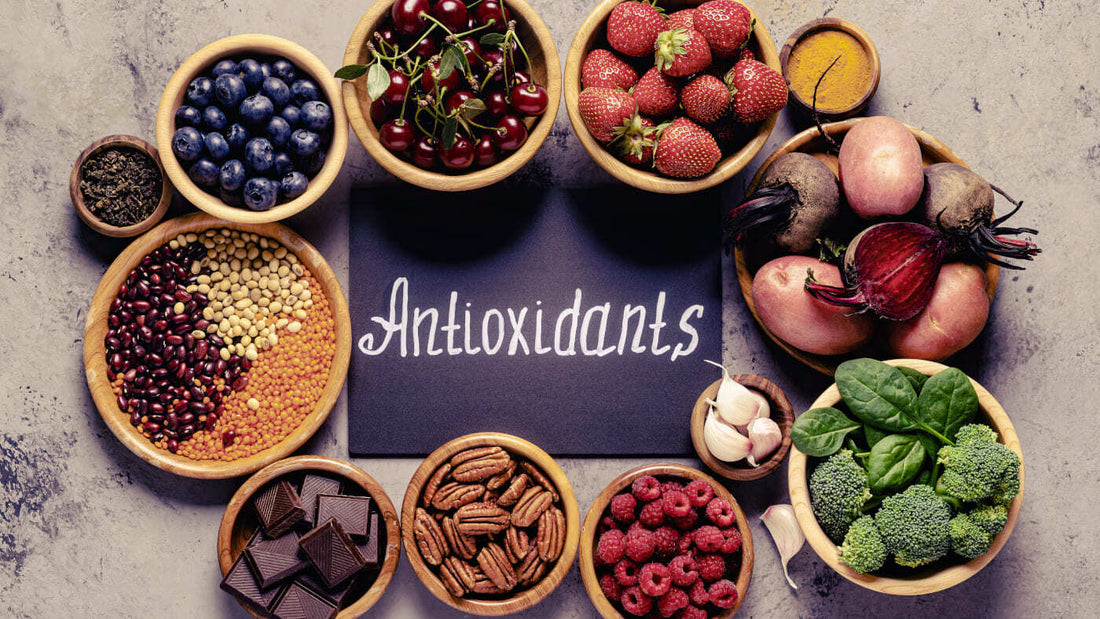In the quest for a healthier lifestyle, incorporating antioxidant-rich foods into your diet is a game-changer. Antioxidants are powerful compounds that protect your cells from damage caused by free radicals, unstable molecules that can lead to chronic diseases and aging. A diet rich in plant-based foods can provide a wide array of antioxidants, promoting overall well-being and longevity. In this article, we’ll explore the top 10 antioxidant-rich, plant-based foods that can help you boost your health naturally.
Understanding Antioxidants
Before we dive into the list, it’s essential to understand what antioxidants are and how they benefit our health. Antioxidants neutralize free radicals, reducing oxidative stress and inflammation in the body. This process helps prevent cellular damage and lowers the risk of chronic diseases such as heart disease, cancer, and neurodegenerative disorders.
The Top 10 Antioxidant-Rich, Plant-Based Foods
1. Berries
Blueberries, Strawberries, Raspberries, and Blackberries
Berries are among the most potent sources of antioxidants, particularly anthocyanins, which give them their vibrant colors. Blueberries, strawberries, raspberries, and blackberries are all rich in vitamin C, vitamin E, and various phytochemicals. These compounds help reduce inflammation, boost brain health, and protect against heart disease.
Nutritional Highlight: One cup of blueberries provides 24% of the daily recommended intake of vitamin C and 36% of vitamin K.
2. Dark Leafy Greens

Spinach, Kale, and Swiss Chard
Dark leafy greens like spinach, kale, and Swiss chard are loaded with antioxidants, including vitamins A, C, and E, as well as flavonoids and carotenoids. These vegetables support eye health, enhance immune function, and reduce the risk of chronic diseases.
Nutritional Highlight: One cup of raw kale contains over 100% of the daily recommended intake of vitamin A and K.
3. Nuts and Seeds
Almonds, Walnuts, Chia Seeds, and Flaxseeds
Nuts and seeds are excellent sources of antioxidants, healthy fats, and essential nutrients. Almonds and walnuts are particularly rich in vitamin E, which protects cell membranes from damage. Chia seeds and flaxseeds provide lignans and alpha-linolenic acid (ALA), promoting heart health and reducing inflammation.
Nutritional Highlight: One ounce of almonds offers 37% of the daily recommended intake of vitamin E.
4. Beans and Legumes
Black Beans, Kidney Beans, Lentils, and Chickpeas
Beans and legumes are packed with antioxidants, fiber, and protein. Black beans and kidney beans are particularly high in anthocyanins, while lentils and chickpeas provide significant amounts of polyphenols. These nutrients support heart health, regulate blood sugar levels, and improve digestive health.
Nutritional Highlight: One cup of cooked lentils provides 90% of the daily recommended intake of folate.
5. Dark Chocolate
Cocoa and Dark Chocolate
Dark chocolate, especially varieties with 70% cocoa or higher, is a delicious and rich source of antioxidants such as flavonoids and polyphenols. These compounds have been shown to improve heart health, enhance brain function, and reduce inflammation.

Nutritional Highlight: One ounce of dark chocolate with 70-85% cocoa contains 11 grams of fiber and 67% of the daily recommended intake of iron.
6. Green Tea
Matcha and Traditional Green Tea
Green tea, particularly matcha, is loaded with catechins, a type of antioxidant that helps reduce inflammation, improve brain function, and promote heart health. Drinking green tea regularly can also boost metabolism and support weight management.
Nutritional Highlight: One cup of green tea provides 25-30 mg of catechins.

7. Cruciferous Vegetables
Broccoli, Brussels Sprouts, and Cauliflower
Cruciferous vegetables like broccoli, Brussels sprouts, and cauliflower are rich in antioxidants, including vitamins C and E, as well as sulforaphane and glucosinolates. These compounds support detoxification processes, enhance immune function, and protect against cancer.
Nutritional Highlight: One cup of cooked broccoli provides 135% of the daily recommended intake of vitamin C.
8. Citrus Fruits
Oranges, Grapefruits, Lemons, and Limes
Citrus fruits are renowned for their high vitamin C content, a potent antioxidant that boosts immune health, enhances skin health, and reduces the risk of chronic diseases. They also contain flavonoids like hesperidin, which have anti-inflammatory and cardiovascular benefits.
Nutritional Highlight: One medium orange provides 70 mg of vitamin C, which is 78% of the daily recommended intake.
9. Sweet Potatoes
Sweet potatoes are rich in beta-carotene, an antioxidant that the body converts into vitamin A. This nutrient supports eye health, boosts immune function, and promotes healthy skin. Sweet potatoes also contain other antioxidants like vitamins C and E, which further enhance their health benefits.
Nutritional Highlight: One medium sweet potato provides 438% of the daily recommended intake of vitamin A.
10. Whole Grains
Quinoa, Brown Rice, and Oats
Whole grains like quinoa, brown rice, and oats are excellent sources of antioxidants, including vitamin E, selenium, and phytic acid. These nutrients help reduce inflammation, support heart health, and improve digestive function.
Nutritional Highlight: One cup of cooked quinoa provides 58% of the daily recommended intake of manganese.
Incorporating Antioxidant-Rich Foods into Your Diet
Including these antioxidant-rich, plant-based foods in your diet is easier than you might think. Here are some practical tips to help you get started:
1. Start Your Day with Berries
Add a handful of berries to your morning smoothie, oatmeal, or yogurt. This simple addition can boost your antioxidant intake and provide a refreshing start to your day.
2. Snack on Nuts and Seeds
Keep a mix of almonds, walnuts, chia seeds, and flaxseeds on hand for a convenient and nutritious snack. You can also sprinkle them over salads, cereals, or desserts for added crunch and health benefits.
3. Enjoy Dark Chocolate in Moderation
Indulge in a small piece of dark chocolate with a high cocoa content (70% or higher) as a satisfying and health-boosting treat.
4. Drink Green Tea
Replace sugary drinks with green tea to increase your antioxidant intake. For an extra boost, try matcha, which contains higher levels of catechins compared to traditional green tea.
5. Incorporate Cruciferous Vegetables into Meals
Add broccoli, Brussels sprouts, or cauliflower to your salads, stir-fries, or side dishes. Roasting these vegetables with a drizzle of olive oil and your favorite spices makes for a delicious and healthy addition to any meal.
6. Choose Whole Grains
Opt for whole grains like quinoa, brown rice, and oats instead of refined grains. Whole grains provide more antioxidants, fiber, and nutrients, supporting overall health and well-being.
5 Frequently Asked Questions(FAQs) About Antioxidant RichPlant Based Food
- What are antioxidants, and why are they important?
Antioxidants are compounds that neutralize free radicals, reducing oxidative stress and inflammation in the body. They are essential for protecting cells from damage and lowering the risk of chronic diseases such as heart disease, cancer, and neurodegenerative disorders.
- How can I incorporate more antioxidant-rich foods into my diet?
You can incorporate more antioxidant-rich foods by adding berries to your breakfast, snacking on nuts and seeds, enjoying dark chocolate in moderation, drinking green tea, and including cruciferous vegetables and whole grains in your meals.
- Are plant-based sources of antioxidants better than supplements?
Plant-based sources of antioxidants are generally better than supplements because they provide a complex mix of nutrients and phytochemicals that work synergistically to promote health. Whole foods also offer additional benefits such as fiber and other essential nutrients.
- Can antioxidant-rich foods help with weight management?
Yes, many antioxidant-rich foods, such as berries, nuts, seeds, and green tea, can aid in weight management by promoting satiety, boosting metabolism, and providing essential nutrients that support overall health and well-being.
- Are there any potential side effects of consuming too many antioxidant-rich foods?
While antioxidant-rich foods are generally safe and beneficial, consuming them in excessive amounts through supplements can lead to imbalances and potential side effects. It’s best to obtain antioxidants from a balanced diet rich in a variety of plant-based foods.
Incorporating antioxidant-rich, plant-based foods into your diet is a delicious and effective way to boost your health naturally. From berries and dark leafy greens to nuts, seeds, and whole grains, these foods provide a wealth of nutrients that protect your cells, reduce inflammation, and support overall well-being. By making simple

